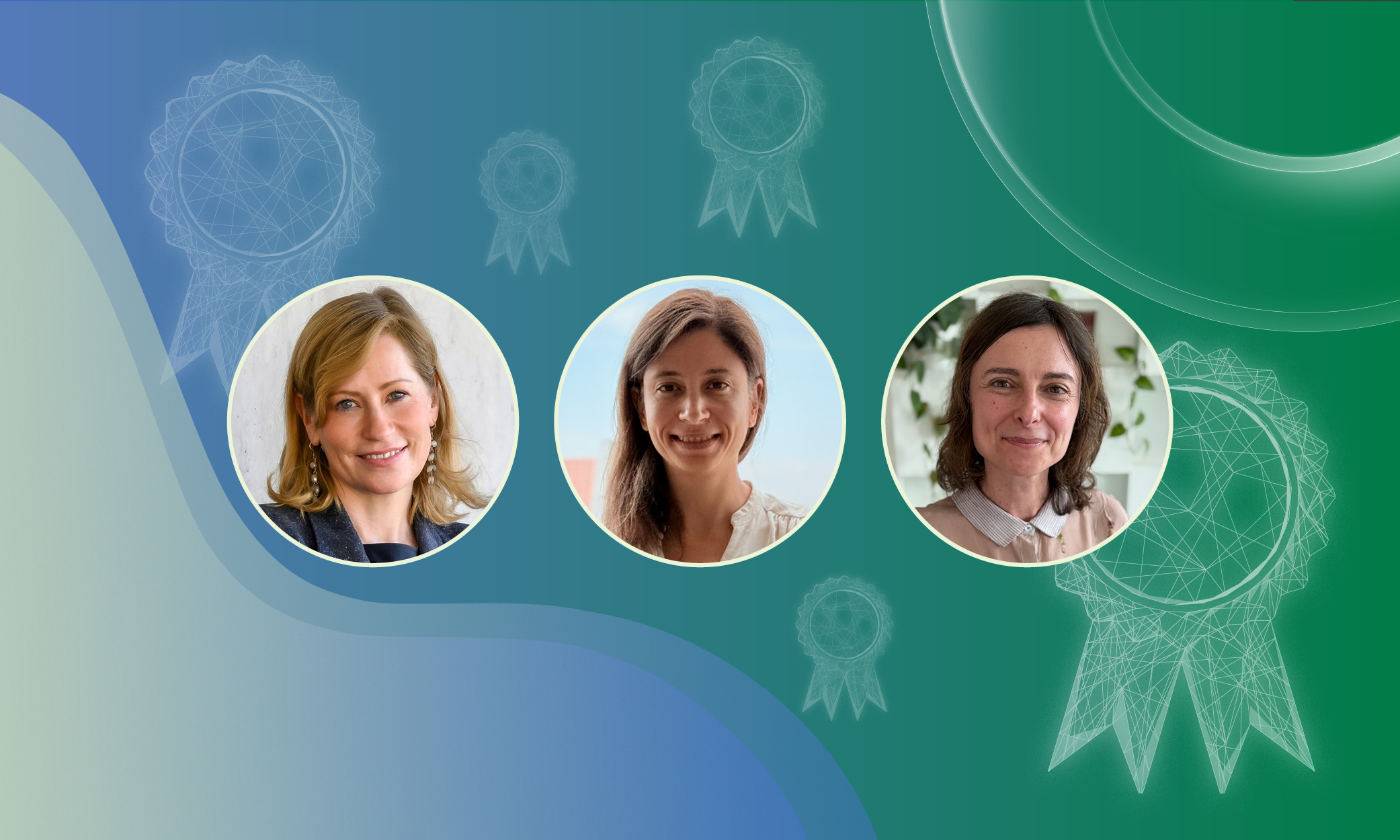EMBL alumnae recognised for breakthroughs in women’s health and precision medicine

Three EMBL alumnae – Melina Schuh, Ângela Gonçalves, and Angela Relógio – have been recognised separately for pioneering work that is redefining how science understands women’s health, ageing, fertility, and personalised medicine.
Visualising ovulation in real time
Melina Schuh (EMBL Heidelberg predoc, Ellenberg Group, 2004–2008) has been awarded Falling Walls’ 2025 Science Breakthrough of the Year in Life Sciences Award for her team’s achievement in filming the entire ovulation process in real time.
Director of the Max Planck Institute for Multidisciplinary Sciences (MPI NAT) in Göttingen, Schuh was selected from 240 global nominations.
Using advanced live-cell microscopy, her team captured ovulation in isolated mouse follicles, revealing that the process occurs in three distinct phases: follicle expansion, contraction, and release. The findings open new avenues for fertility research and deepen understanding of how healthy eggs develop.
Speaking to MPI NAT, she said: “It has always been my dream to make the entire ovulation process visible. This award is a great honour and a motivation to keep asking bold questions and finding new ways to answer them.”
Breaking the wall of healthy ageing in women
Ângela Gonçalves (EMBL-EBI predoc, Brazma Group, 2008–2013) is the winner of Falling Walls Foundation’s 2025 Science Breakthrough of the Year in the Women’s Impact Award category.
Now a Professor at Heidelberg University and Group Leader at the German Cancer Research Center (DKFZ), Gonçalves has been recognised for her project “How the biological clock ticks in the female reproductive tract: the influence of reproductive cycling on ageing and disease.”
Her research combines AI, molecular biology, and clinical insight to develop non-invasive tools for the early detection and prevention of conditions such as endometriosis, ovarian cancer, and menopause-related disorders.
“Biomedical science has historically centred on male biology,” she said in an interview with Falling Walls. “By applying genomics and AI, we’re building much-needed biological references for female organs and transforming how we diagnose and understand reproductive ageing.”
Timing medicine to the body’s inner clock
Earlier this year, Angela Relógio (EMBL Heidelberg predoc, Kafatos/Valcarcel Groups, 1999–2006) was one of three finalists for the Deutscher Gründerpreis 2025 for TimeTeller, the Hamburg-based health tech startup she co-founded to bring chronobiology into everyday medicine.
Her company was the outright winner of the Hamburger Gründerpreis 2025.
TimeTeller’s diagnostic platform measures a patient’s internal biological time from a simple saliva test, using AI and molecular analysis to identify when the body is most receptive, or sensitive, to specific treatments.
“The company emerged from the work developed in my research group,” said Relógio, now Professor and Head of the Institute for Systems Medicine at the MSH Medical School Hamburg. “If we want to bring a medical device to market, we can’t do it alone as researchers. It requires a company that meets the necessary certifications and regulatory requirements.”
Her company’s goal – to empower individuals and healthcare professionals with knowledge and tools to optimise health and prevent diseases through understanding and applying the power of circadian rhythms – marks a paradigm shift away from one-size-fits-all schedules toward treatment in sync with human biology.
TimeTeller’s saliva test kit is the first medical product to measure an individual’s circadian rhythm and, from 1 November, is being reimbursed through Germany’s largest health insurer, Techniker Krankenkasse (TK), initially offering personalised rhythm-based recommendations for patients undergoing cancer therapy.
Celebrating impact
The Falling Walls Foundation, inspired by the fall of the Berlin Wall, promotes collaboration across disciplines to advance scientific and social progress. The annual Falling Walls Science Summit in Berlin culminates on 9 November with the presentation of the Science Breakthroughs of the Year awards, during which Melina Schuh and Ângela Gonçalves will both present their research.
Gonçalves was announced as a Women’s Impact Award winner on 31 July, while Schuh was announced as Science Breakthroughs of the Year laureate on 16 September.
The Deutscher Gründerpreis is an annual German award recognising outstanding entrepreneurship. It aims to make successful founders and their businesses visible and, through a network of coaching, mentoring and media support, help them become even more successful. TimeTeller was announced as the 2025 Hamburger-Gruenderpreis winner at a ceremony on 16 September.
Together, Gonçalves, Schuh, and Relógio typify how former EMBL researchers continue to shape public health outcomes — in their work, through science that challenges convention, prioritises women’s health, and personalises care for the future. Their recognition underscores the ongoing impact of the EMBL alumni community worldwide.
Have you or a fellow member of the EMBL alumni community recently been recognised for your work? Please contact the Alumni Relations team.